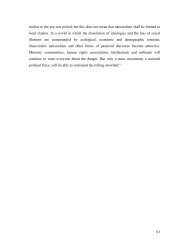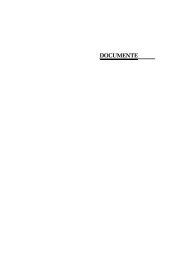Southeast Europe
Southeast Europe
Southeast Europe
Create successful ePaper yourself
Turn your PDF publications into a flip-book with our unique Google optimized e-Paper software.
administer their own private educational units and institutions” have been included.<br />
Articles 10 and 14 also provide the possibility to learn in the mother tongue. “In the<br />
state-owned vocational, secondary and post-secondary specialised schools, education<br />
can be provided in the mother tongue, on request, under the law, on condition that the<br />
specialised terminology is taught in Romanian.” (Art.122).<br />
Art.123 stipulated, (1) “groups, departments, colleges and faculties in national<br />
minorities’ languages could be established on request within state-owned universities,<br />
under legal circumstances”. In this case, specific terminology would be provided in the<br />
Romanian language. Multicultural higher education institutions could be established on<br />
request, in conformity with the law. (2) “Individuals belonging to the national minorities<br />
were accorded the right to establish and administer their own private higher education<br />
institutions, in conformity with the law.” The same applied to state-owned “higher<br />
education groups, departments, colleges, faculties and institutes of education”, and a<br />
provision was included that “on request, Romanian specialists shall be encouraged to be<br />
trained in the languages of national minorities.”<br />
The question of university entrance examinations was addressed once again, this time<br />
with no mention of the Romanian language: “In the education system, at all degrees and<br />
levels, admission and graduation examinations can be taken in the language in which<br />
those subjects were taught” (Government of Romania: 14 July, 1997).<br />
The Romanian education system is almost entirely state-sponsored. The education of the<br />
national minorities depends on the general education system. At present, there are<br />
tendencies to establish confessional and/or privately funded higher educational<br />
institutions. At the general level we can say that the percentage of Hungarian scholars<br />
has been constantly decreasing since 1990 (Papp, 1998). This is valid for both schoollevel<br />
and university education.<br />
Hungarian students at the Babeş-Bolyai University in Cluj (Papp, 1998) and (*The<br />
Ethos of Education for National Minorities in Romania 1999/2000)<br />
Students Hungarian Students<br />
Academic year Total Number %<br />
1989-1990 3,007 661 21.98<br />
1990-1991 7,342 1,357 18.48<br />
1991-1992 9,257 1,570 16.96<br />
1992-1993 12,082 1,917 15.86<br />
1995-1996 16,825 2,682 15.94<br />
1999-2000* 22,727 4,904 21.57<br />
Questions regarding education are the most delicate. Political representatives of the<br />
Hungarians consider that in the long run the only way to preserve national identity is to<br />
reproduce intellectuals. They believe that this can be done only if a separate Hungarian<br />
university is established. They explain that only in this case will Hungarians send their<br />
children to Hungarian schools.<br />
No state-funded Hungarian higher education has been established. However, there are<br />
classes taught in Hungarian within the “Babeş-Bolyai” University in Cluj with 39<br />
specialisations; within the University of Medicine and Pharmacy in Târgu Mureş with<br />
specialisations in medicine, dentistry, and pharmacy; and within the “Szentgyörgyi<br />
István” Drama Academy in Tîrgu Mureş. In the 1999 academic year colleges with<br />
41









